Reflective Journal: Reflections on Team Performance and Report Writing
VerifiedAdded on 2023/06/15
|9
|2294
|136
Journal and Reflective Writing
AI Summary
This reflective journal documents a student's experiences and challenges in team forming/performance and report writing. The student reflects on an initial team leadership role where a newly formed team failed to meet deadlines due to poor communication, cultural stereotypes, and lack of clear roles. The student also recounts receiving criticism for an unprofessional report lacking proper formatting and structure. Through reflection, the student identifies key mistakes in team management, such as neglecting the forming, storming, and norming stages, and in report writing, such as failing to follow proper formatting guidelines. The student outlines future steps to improve teamwork skills, including emphasizing communication, feedback, and role clarity, and to enhance report writing skills through careful planning, structured formatting, and clear conclusions. The journal concludes with an understanding of the importance of these skills for future professional success and highlights the need for continuous improvement in both areas.
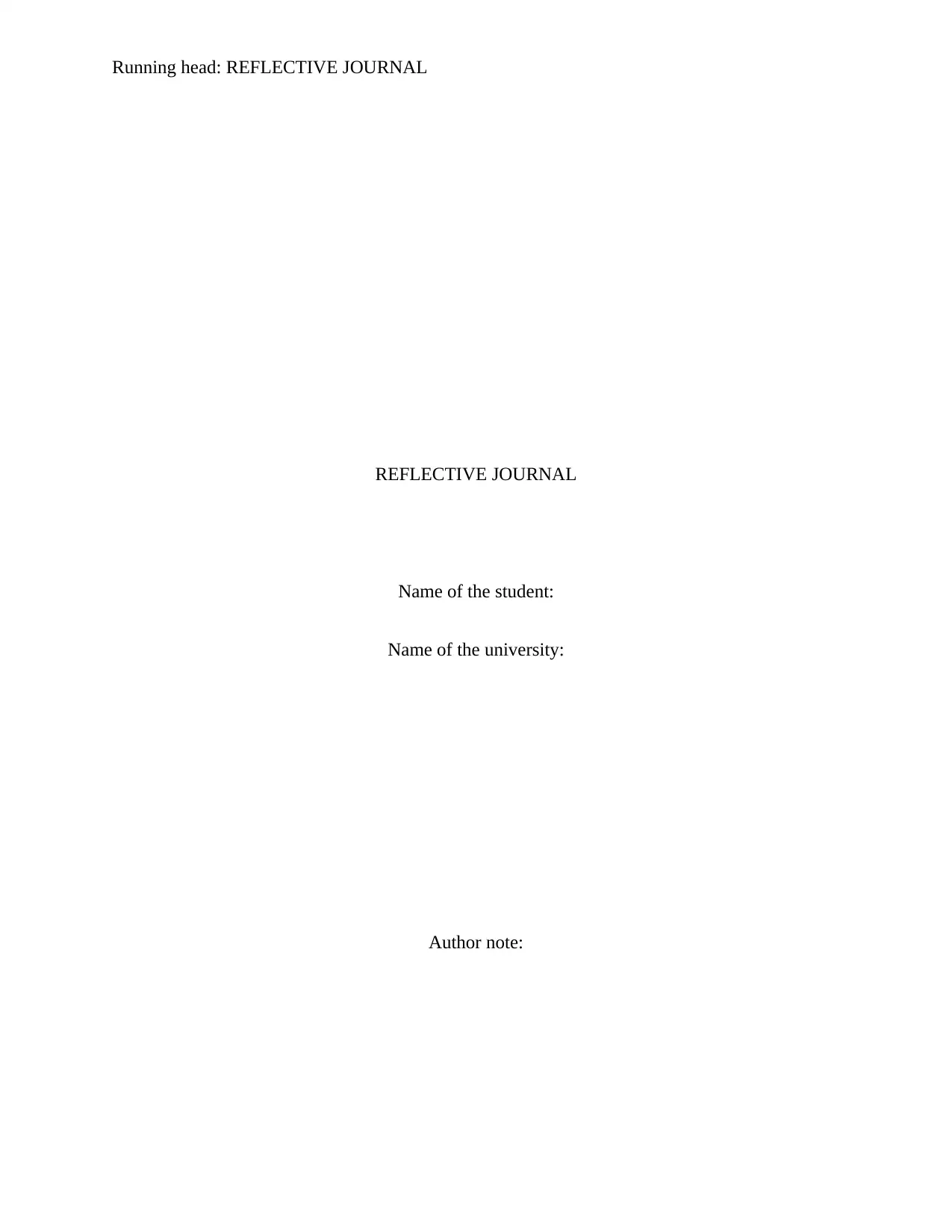
Running head: REFLECTIVE JOURNAL
REFLECTIVE JOURNAL
Name of the student:
Name of the university:
Author note:
REFLECTIVE JOURNAL
Name of the student:
Name of the university:
Author note:
Paraphrase This Document
Need a fresh take? Get an instant paraphrase of this document with our AI Paraphraser
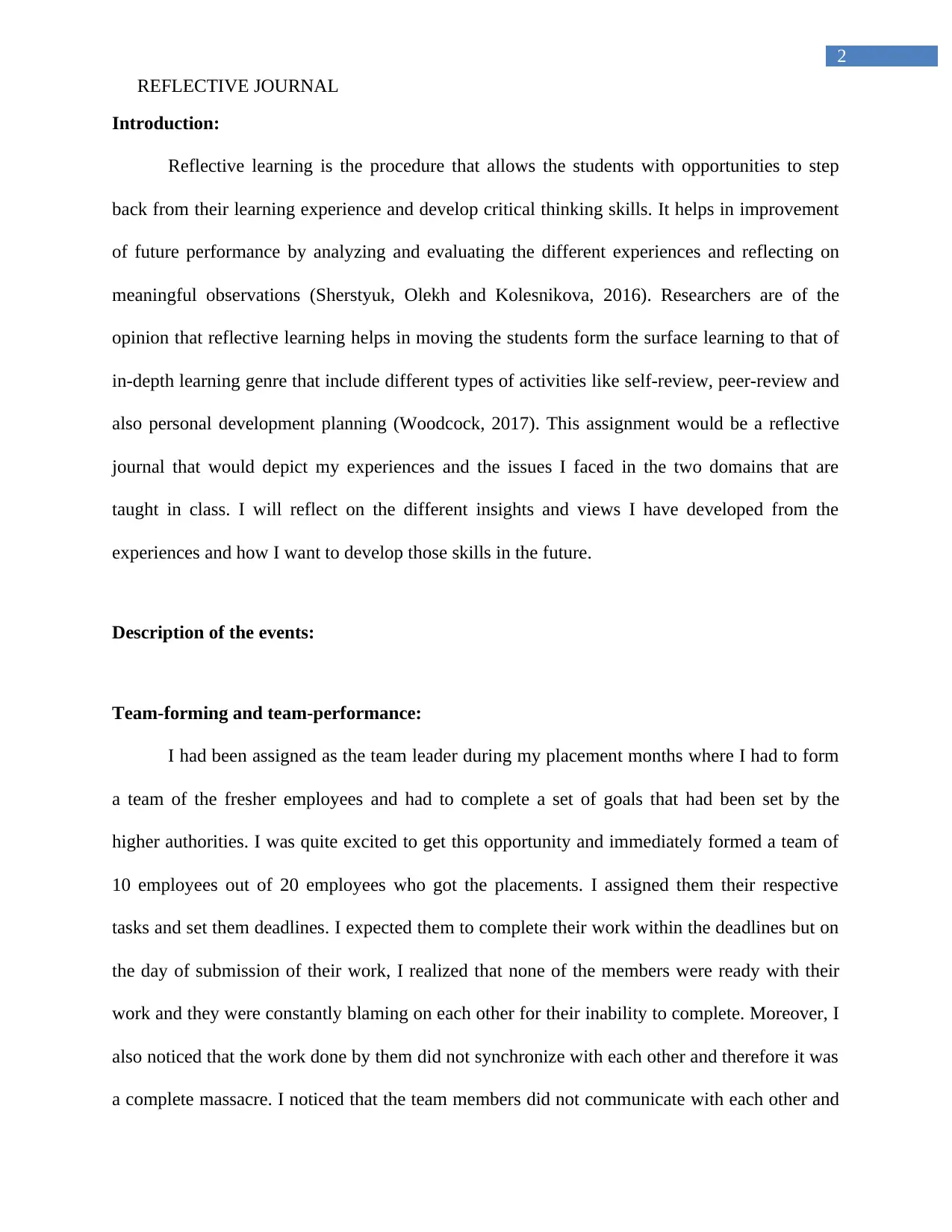
2
REFLECTIVE JOURNAL
Introduction:
Reflective learning is the procedure that allows the students with opportunities to step
back from their learning experience and develop critical thinking skills. It helps in improvement
of future performance by analyzing and evaluating the different experiences and reflecting on
meaningful observations (Sherstyuk, Olekh and Kolesnikova, 2016). Researchers are of the
opinion that reflective learning helps in moving the students form the surface learning to that of
in-depth learning genre that include different types of activities like self-review, peer-review and
also personal development planning (Woodcock, 2017). This assignment would be a reflective
journal that would depict my experiences and the issues I faced in the two domains that are
taught in class. I will reflect on the different insights and views I have developed from the
experiences and how I want to develop those skills in the future.
Description of the events:
Team-forming and team-performance:
I had been assigned as the team leader during my placement months where I had to form
a team of the fresher employees and had to complete a set of goals that had been set by the
higher authorities. I was quite excited to get this opportunity and immediately formed a team of
10 employees out of 20 employees who got the placements. I assigned them their respective
tasks and set them deadlines. I expected them to complete their work within the deadlines but on
the day of submission of their work, I realized that none of the members were ready with their
work and they were constantly blaming on each other for their inability to complete. Moreover, I
also noticed that the work done by them did not synchronize with each other and therefore it was
a complete massacre. I noticed that the team members did not communicate with each other and
REFLECTIVE JOURNAL
Introduction:
Reflective learning is the procedure that allows the students with opportunities to step
back from their learning experience and develop critical thinking skills. It helps in improvement
of future performance by analyzing and evaluating the different experiences and reflecting on
meaningful observations (Sherstyuk, Olekh and Kolesnikova, 2016). Researchers are of the
opinion that reflective learning helps in moving the students form the surface learning to that of
in-depth learning genre that include different types of activities like self-review, peer-review and
also personal development planning (Woodcock, 2017). This assignment would be a reflective
journal that would depict my experiences and the issues I faced in the two domains that are
taught in class. I will reflect on the different insights and views I have developed from the
experiences and how I want to develop those skills in the future.
Description of the events:
Team-forming and team-performance:
I had been assigned as the team leader during my placement months where I had to form
a team of the fresher employees and had to complete a set of goals that had been set by the
higher authorities. I was quite excited to get this opportunity and immediately formed a team of
10 employees out of 20 employees who got the placements. I assigned them their respective
tasks and set them deadlines. I expected them to complete their work within the deadlines but on
the day of submission of their work, I realized that none of the members were ready with their
work and they were constantly blaming on each other for their inability to complete. Moreover, I
also noticed that the work done by them did not synchronize with each other and therefore it was
a complete massacre. I noticed that the team members did not communicate with each other and
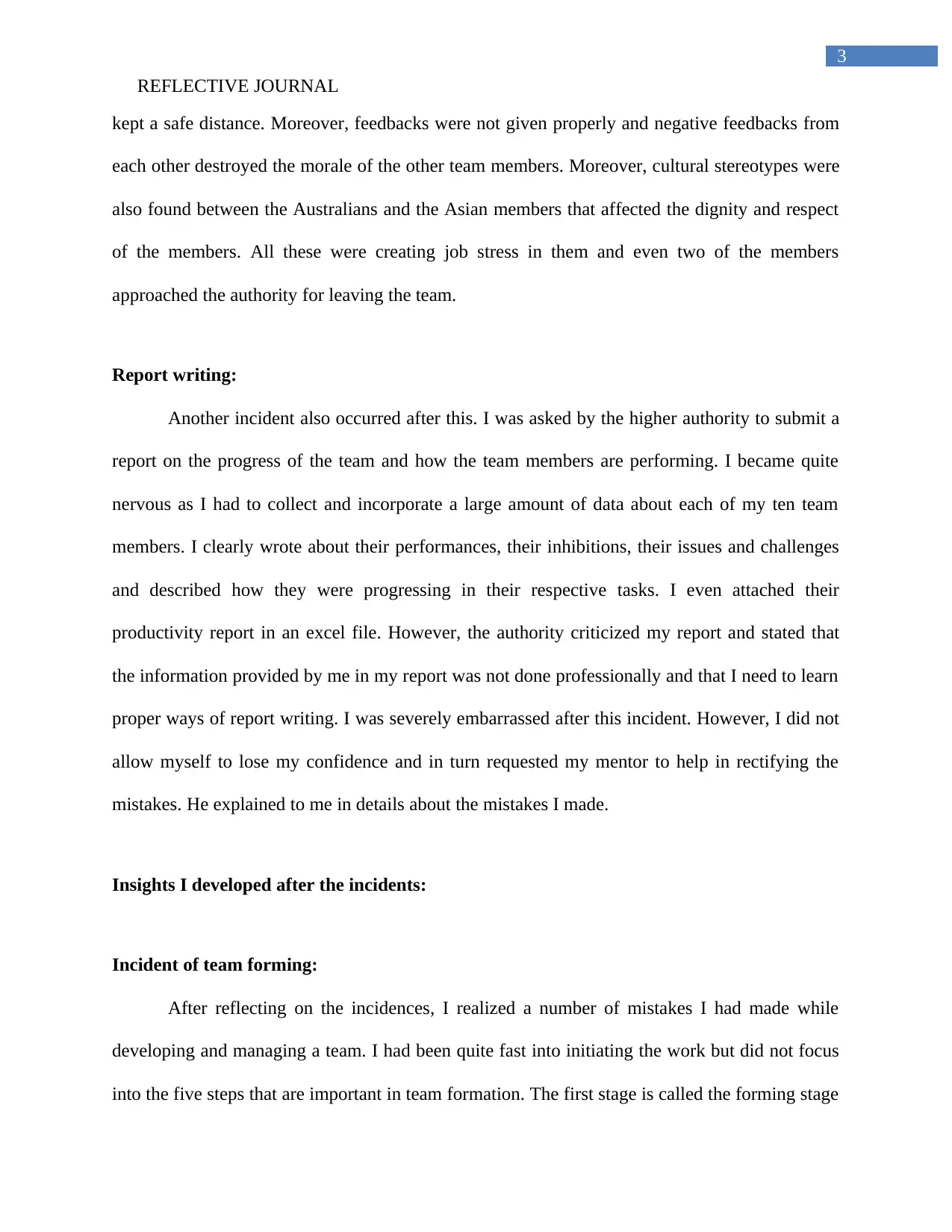
3
REFLECTIVE JOURNAL
kept a safe distance. Moreover, feedbacks were not given properly and negative feedbacks from
each other destroyed the morale of the other team members. Moreover, cultural stereotypes were
also found between the Australians and the Asian members that affected the dignity and respect
of the members. All these were creating job stress in them and even two of the members
approached the authority for leaving the team.
Report writing:
Another incident also occurred after this. I was asked by the higher authority to submit a
report on the progress of the team and how the team members are performing. I became quite
nervous as I had to collect and incorporate a large amount of data about each of my ten team
members. I clearly wrote about their performances, their inhibitions, their issues and challenges
and described how they were progressing in their respective tasks. I even attached their
productivity report in an excel file. However, the authority criticized my report and stated that
the information provided by me in my report was not done professionally and that I need to learn
proper ways of report writing. I was severely embarrassed after this incident. However, I did not
allow myself to lose my confidence and in turn requested my mentor to help in rectifying the
mistakes. He explained to me in details about the mistakes I made.
Insights I developed after the incidents:
Incident of team forming:
After reflecting on the incidences, I realized a number of mistakes I had made while
developing and managing a team. I had been quite fast into initiating the work but did not focus
into the five steps that are important in team formation. The first stage is called the forming stage
REFLECTIVE JOURNAL
kept a safe distance. Moreover, feedbacks were not given properly and negative feedbacks from
each other destroyed the morale of the other team members. Moreover, cultural stereotypes were
also found between the Australians and the Asian members that affected the dignity and respect
of the members. All these were creating job stress in them and even two of the members
approached the authority for leaving the team.
Report writing:
Another incident also occurred after this. I was asked by the higher authority to submit a
report on the progress of the team and how the team members are performing. I became quite
nervous as I had to collect and incorporate a large amount of data about each of my ten team
members. I clearly wrote about their performances, their inhibitions, their issues and challenges
and described how they were progressing in their respective tasks. I even attached their
productivity report in an excel file. However, the authority criticized my report and stated that
the information provided by me in my report was not done professionally and that I need to learn
proper ways of report writing. I was severely embarrassed after this incident. However, I did not
allow myself to lose my confidence and in turn requested my mentor to help in rectifying the
mistakes. He explained to me in details about the mistakes I made.
Insights I developed after the incidents:
Incident of team forming:
After reflecting on the incidences, I realized a number of mistakes I had made while
developing and managing a team. I had been quite fast into initiating the work but did not focus
into the five steps that are important in team formation. The first stage is called the forming stage
⊘ This is a preview!⊘
Do you want full access?
Subscribe today to unlock all pages.

Trusted by 1+ million students worldwide
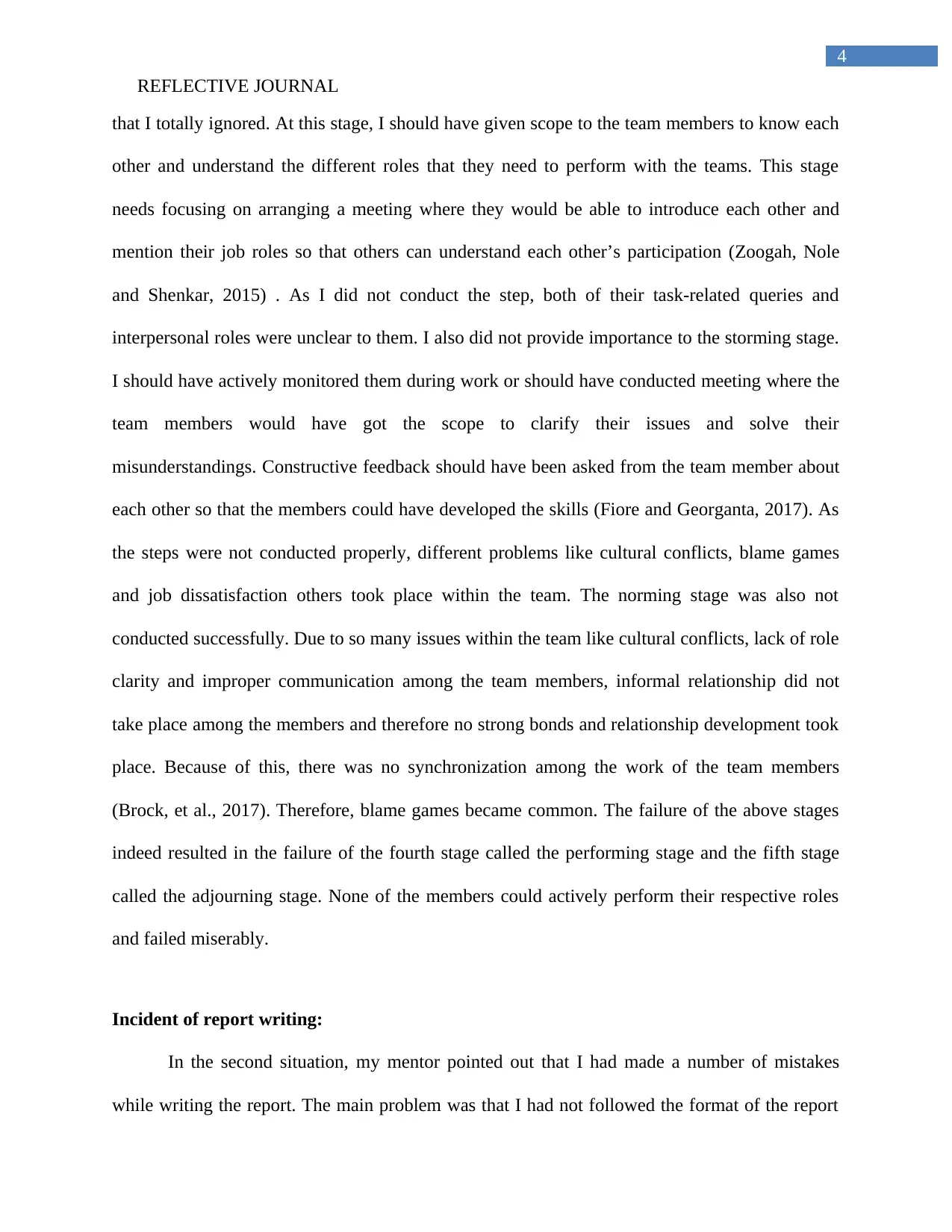
4
REFLECTIVE JOURNAL
that I totally ignored. At this stage, I should have given scope to the team members to know each
other and understand the different roles that they need to perform with the teams. This stage
needs focusing on arranging a meeting where they would be able to introduce each other and
mention their job roles so that others can understand each other’s participation (Zoogah, Nole
and Shenkar, 2015) . As I did not conduct the step, both of their task-related queries and
interpersonal roles were unclear to them. I also did not provide importance to the storming stage.
I should have actively monitored them during work or should have conducted meeting where the
team members would have got the scope to clarify their issues and solve their
misunderstandings. Constructive feedback should have been asked from the team member about
each other so that the members could have developed the skills (Fiore and Georganta, 2017). As
the steps were not conducted properly, different problems like cultural conflicts, blame games
and job dissatisfaction others took place within the team. The norming stage was also not
conducted successfully. Due to so many issues within the team like cultural conflicts, lack of role
clarity and improper communication among the team members, informal relationship did not
take place among the members and therefore no strong bonds and relationship development took
place. Because of this, there was no synchronization among the work of the team members
(Brock, et al., 2017). Therefore, blame games became common. The failure of the above stages
indeed resulted in the failure of the fourth stage called the performing stage and the fifth stage
called the adjourning stage. None of the members could actively perform their respective roles
and failed miserably.
Incident of report writing:
In the second situation, my mentor pointed out that I had made a number of mistakes
while writing the report. The main problem was that I had not followed the format of the report
REFLECTIVE JOURNAL
that I totally ignored. At this stage, I should have given scope to the team members to know each
other and understand the different roles that they need to perform with the teams. This stage
needs focusing on arranging a meeting where they would be able to introduce each other and
mention their job roles so that others can understand each other’s participation (Zoogah, Nole
and Shenkar, 2015) . As I did not conduct the step, both of their task-related queries and
interpersonal roles were unclear to them. I also did not provide importance to the storming stage.
I should have actively monitored them during work or should have conducted meeting where the
team members would have got the scope to clarify their issues and solve their
misunderstandings. Constructive feedback should have been asked from the team member about
each other so that the members could have developed the skills (Fiore and Georganta, 2017). As
the steps were not conducted properly, different problems like cultural conflicts, blame games
and job dissatisfaction others took place within the team. The norming stage was also not
conducted successfully. Due to so many issues within the team like cultural conflicts, lack of role
clarity and improper communication among the team members, informal relationship did not
take place among the members and therefore no strong bonds and relationship development took
place. Because of this, there was no synchronization among the work of the team members
(Brock, et al., 2017). Therefore, blame games became common. The failure of the above stages
indeed resulted in the failure of the fourth stage called the performing stage and the fifth stage
called the adjourning stage. None of the members could actively perform their respective roles
and failed miserably.
Incident of report writing:
In the second situation, my mentor pointed out that I had made a number of mistakes
while writing the report. The main problem was that I had not followed the format of the report
Paraphrase This Document
Need a fresh take? Get an instant paraphrase of this document with our AI Paraphraser
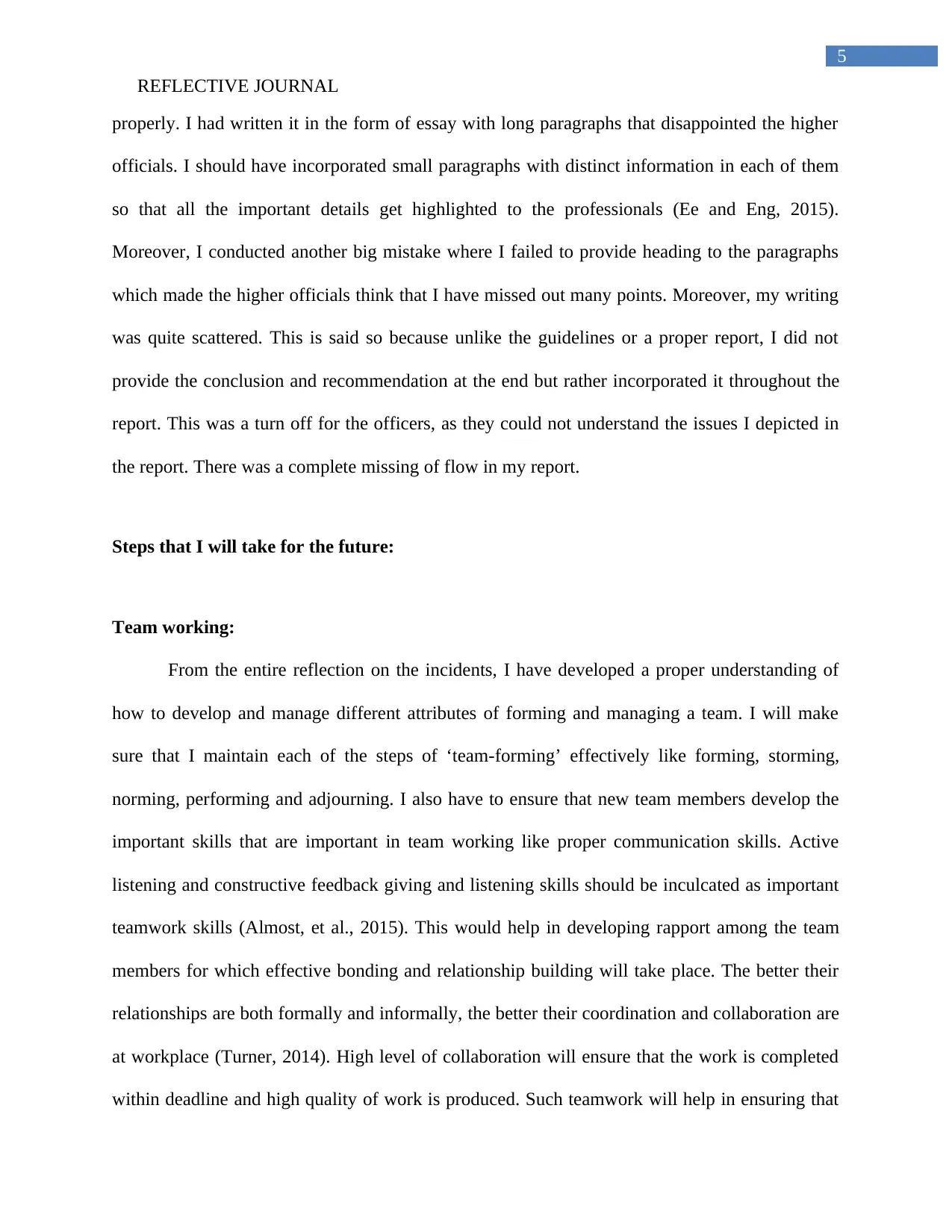
5
REFLECTIVE JOURNAL
properly. I had written it in the form of essay with long paragraphs that disappointed the higher
officials. I should have incorporated small paragraphs with distinct information in each of them
so that all the important details get highlighted to the professionals (Ee and Eng, 2015).
Moreover, I conducted another big mistake where I failed to provide heading to the paragraphs
which made the higher officials think that I have missed out many points. Moreover, my writing
was quite scattered. This is said so because unlike the guidelines or a proper report, I did not
provide the conclusion and recommendation at the end but rather incorporated it throughout the
report. This was a turn off for the officers, as they could not understand the issues I depicted in
the report. There was a complete missing of flow in my report.
Steps that I will take for the future:
Team working:
From the entire reflection on the incidents, I have developed a proper understanding of
how to develop and manage different attributes of forming and managing a team. I will make
sure that I maintain each of the steps of ‘team-forming’ effectively like forming, storming,
norming, performing and adjourning. I also have to ensure that new team members develop the
important skills that are important in team working like proper communication skills. Active
listening and constructive feedback giving and listening skills should be inculcated as important
teamwork skills (Almost, et al., 2015). This would help in developing rapport among the team
members for which effective bonding and relationship building will take place. The better their
relationships are both formally and informally, the better their coordination and collaboration are
at workplace (Turner, 2014). High level of collaboration will ensure that the work is completed
within deadline and high quality of work is produced. Such teamwork will help in ensuring that
REFLECTIVE JOURNAL
properly. I had written it in the form of essay with long paragraphs that disappointed the higher
officials. I should have incorporated small paragraphs with distinct information in each of them
so that all the important details get highlighted to the professionals (Ee and Eng, 2015).
Moreover, I conducted another big mistake where I failed to provide heading to the paragraphs
which made the higher officials think that I have missed out many points. Moreover, my writing
was quite scattered. This is said so because unlike the guidelines or a proper report, I did not
provide the conclusion and recommendation at the end but rather incorporated it throughout the
report. This was a turn off for the officers, as they could not understand the issues I depicted in
the report. There was a complete missing of flow in my report.
Steps that I will take for the future:
Team working:
From the entire reflection on the incidents, I have developed a proper understanding of
how to develop and manage different attributes of forming and managing a team. I will make
sure that I maintain each of the steps of ‘team-forming’ effectively like forming, storming,
norming, performing and adjourning. I also have to ensure that new team members develop the
important skills that are important in team working like proper communication skills. Active
listening and constructive feedback giving and listening skills should be inculcated as important
teamwork skills (Almost, et al., 2015). This would help in developing rapport among the team
members for which effective bonding and relationship building will take place. The better their
relationships are both formally and informally, the better their coordination and collaboration are
at workplace (Turner, 2014). High level of collaboration will ensure that the work is completed
within deadline and high quality of work is produced. Such teamwork will help in ensuring that
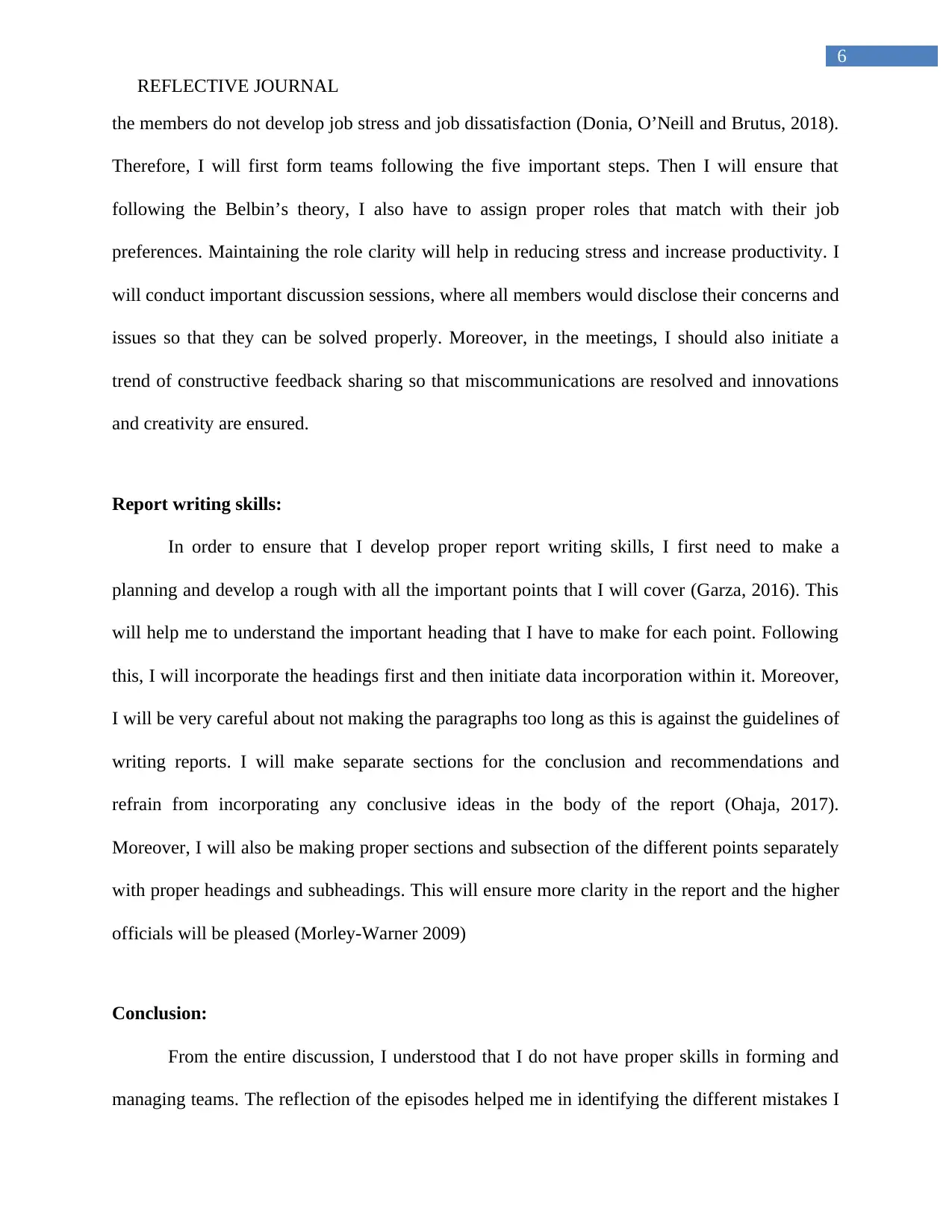
6
REFLECTIVE JOURNAL
the members do not develop job stress and job dissatisfaction (Donia, O’Neill and Brutus, 2018).
Therefore, I will first form teams following the five important steps. Then I will ensure that
following the Belbin’s theory, I also have to assign proper roles that match with their job
preferences. Maintaining the role clarity will help in reducing stress and increase productivity. I
will conduct important discussion sessions, where all members would disclose their concerns and
issues so that they can be solved properly. Moreover, in the meetings, I should also initiate a
trend of constructive feedback sharing so that miscommunications are resolved and innovations
and creativity are ensured.
Report writing skills:
In order to ensure that I develop proper report writing skills, I first need to make a
planning and develop a rough with all the important points that I will cover (Garza, 2016). This
will help me to understand the important heading that I have to make for each point. Following
this, I will incorporate the headings first and then initiate data incorporation within it. Moreover,
I will be very careful about not making the paragraphs too long as this is against the guidelines of
writing reports. I will make separate sections for the conclusion and recommendations and
refrain from incorporating any conclusive ideas in the body of the report (Ohaja, 2017).
Moreover, I will also be making proper sections and subsection of the different points separately
with proper headings and subheadings. This will ensure more clarity in the report and the higher
officials will be pleased (Morley-Warner 2009)
Conclusion:
From the entire discussion, I understood that I do not have proper skills in forming and
managing teams. The reflection of the episodes helped me in identifying the different mistakes I
REFLECTIVE JOURNAL
the members do not develop job stress and job dissatisfaction (Donia, O’Neill and Brutus, 2018).
Therefore, I will first form teams following the five important steps. Then I will ensure that
following the Belbin’s theory, I also have to assign proper roles that match with their job
preferences. Maintaining the role clarity will help in reducing stress and increase productivity. I
will conduct important discussion sessions, where all members would disclose their concerns and
issues so that they can be solved properly. Moreover, in the meetings, I should also initiate a
trend of constructive feedback sharing so that miscommunications are resolved and innovations
and creativity are ensured.
Report writing skills:
In order to ensure that I develop proper report writing skills, I first need to make a
planning and develop a rough with all the important points that I will cover (Garza, 2016). This
will help me to understand the important heading that I have to make for each point. Following
this, I will incorporate the headings first and then initiate data incorporation within it. Moreover,
I will be very careful about not making the paragraphs too long as this is against the guidelines of
writing reports. I will make separate sections for the conclusion and recommendations and
refrain from incorporating any conclusive ideas in the body of the report (Ohaja, 2017).
Moreover, I will also be making proper sections and subsection of the different points separately
with proper headings and subheadings. This will ensure more clarity in the report and the higher
officials will be pleased (Morley-Warner 2009)
Conclusion:
From the entire discussion, I understood that I do not have proper skills in forming and
managing teams. The reflection of the episodes helped me in identifying the different mistakes I
⊘ This is a preview!⊘
Do you want full access?
Subscribe today to unlock all pages.

Trusted by 1+ million students worldwide
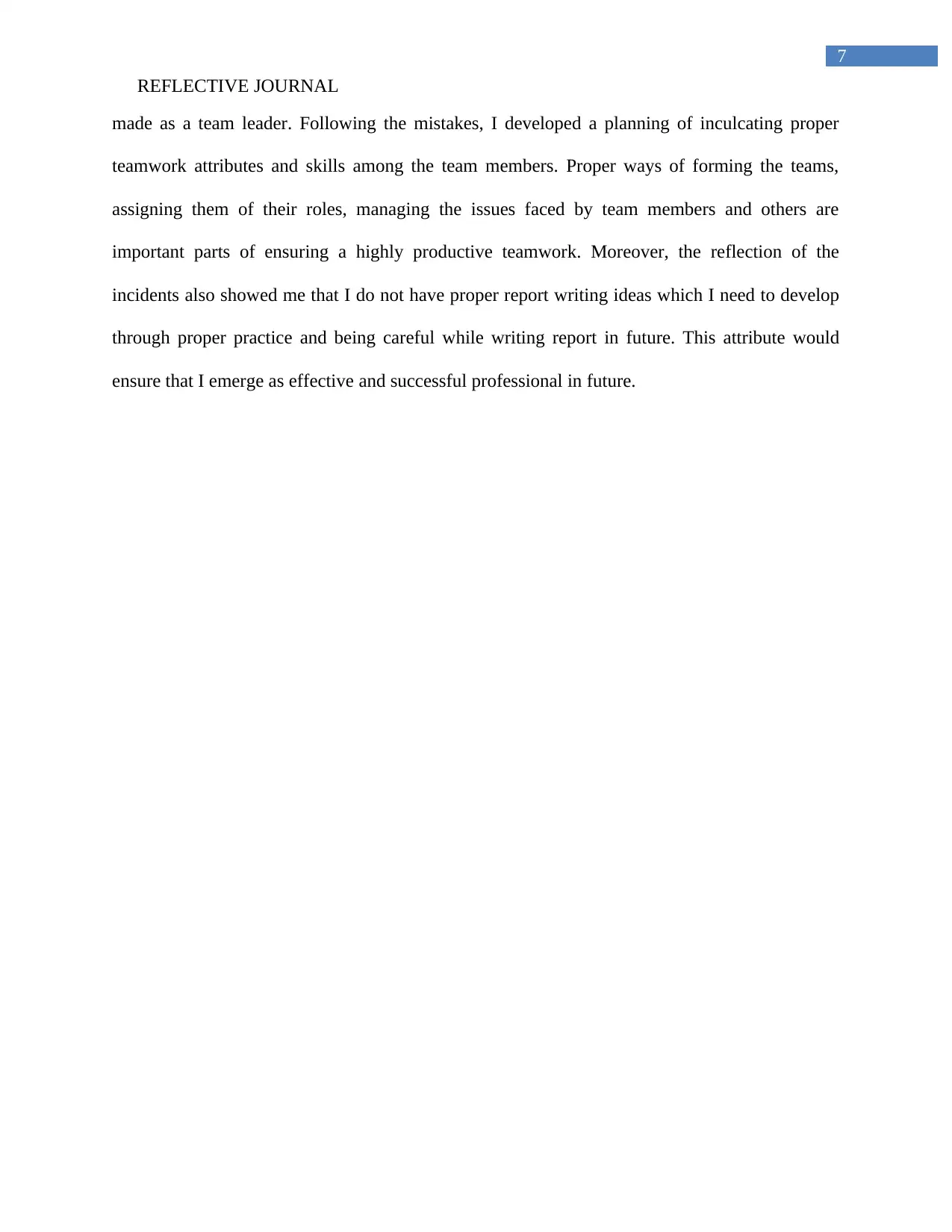
7
REFLECTIVE JOURNAL
made as a team leader. Following the mistakes, I developed a planning of inculcating proper
teamwork attributes and skills among the team members. Proper ways of forming the teams,
assigning them of their roles, managing the issues faced by team members and others are
important parts of ensuring a highly productive teamwork. Moreover, the reflection of the
incidents also showed me that I do not have proper report writing ideas which I need to develop
through proper practice and being careful while writing report in future. This attribute would
ensure that I emerge as effective and successful professional in future.
REFLECTIVE JOURNAL
made as a team leader. Following the mistakes, I developed a planning of inculcating proper
teamwork attributes and skills among the team members. Proper ways of forming the teams,
assigning them of their roles, managing the issues faced by team members and others are
important parts of ensuring a highly productive teamwork. Moreover, the reflection of the
incidents also showed me that I do not have proper report writing ideas which I need to develop
through proper practice and being careful while writing report in future. This attribute would
ensure that I emerge as effective and successful professional in future.
Paraphrase This Document
Need a fresh take? Get an instant paraphrase of this document with our AI Paraphraser
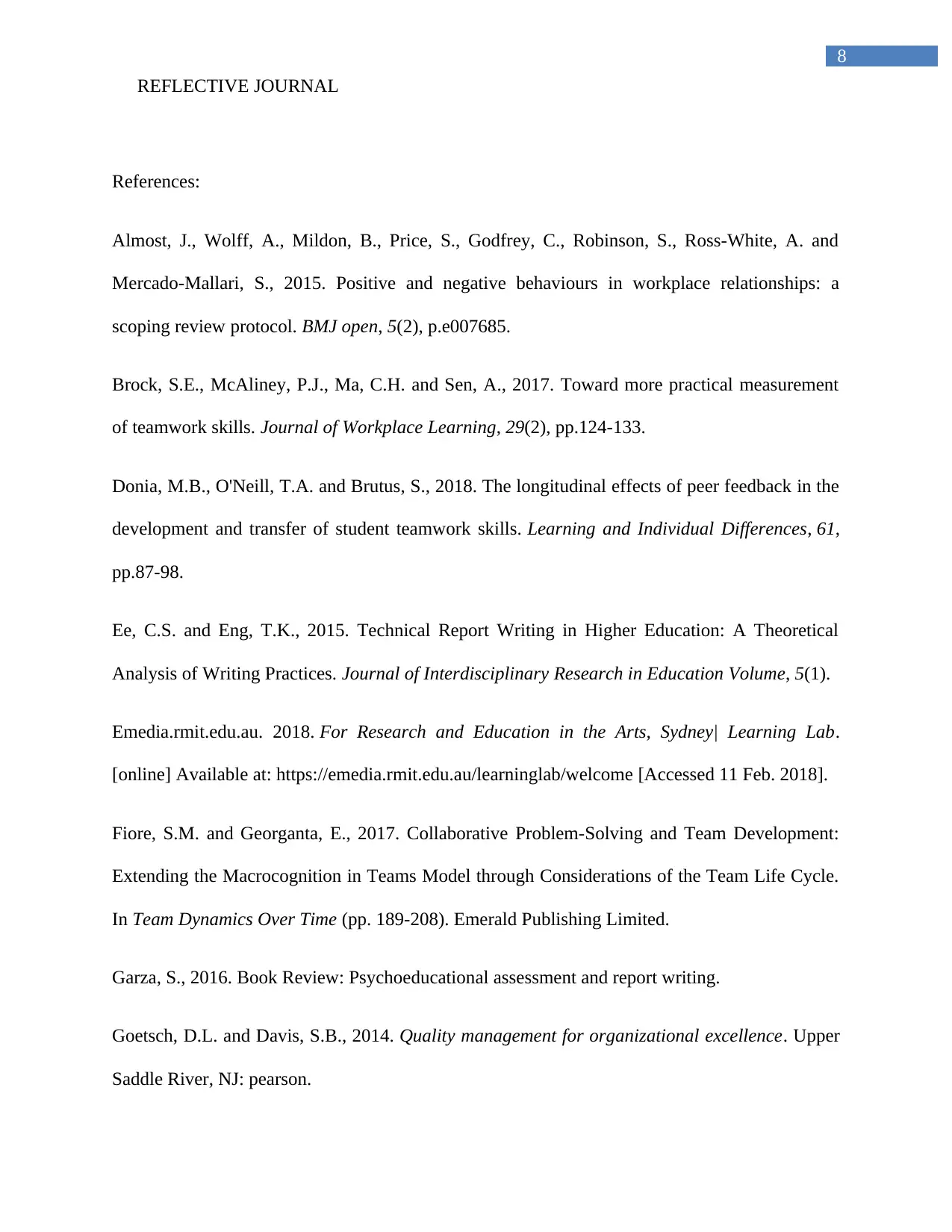
8
REFLECTIVE JOURNAL
References:
Almost, J., Wolff, A., Mildon, B., Price, S., Godfrey, C., Robinson, S., Ross-White, A. and
Mercado-Mallari, S., 2015. Positive and negative behaviours in workplace relationships: a
scoping review protocol. BMJ open, 5(2), p.e007685.
Brock, S.E., McAliney, P.J., Ma, C.H. and Sen, A., 2017. Toward more practical measurement
of teamwork skills. Journal of Workplace Learning, 29(2), pp.124-133.
Donia, M.B., O'Neill, T.A. and Brutus, S., 2018. The longitudinal effects of peer feedback in the
development and transfer of student teamwork skills. Learning and Individual Differences, 61,
pp.87-98.
Ee, C.S. and Eng, T.K., 2015. Technical Report Writing in Higher Education: A Theoretical
Analysis of Writing Practices. Journal of Interdisciplinary Research in Education Volume, 5(1).
Emedia.rmit.edu.au. 2018. For Research and Education in the Arts, Sydney| Learning Lab.
[online] Available at: https://emedia.rmit.edu.au/learninglab/welcome [Accessed 11 Feb. 2018].
Fiore, S.M. and Georganta, E., 2017. Collaborative Problem-Solving and Team Development:
Extending the Macrocognition in Teams Model through Considerations of the Team Life Cycle.
In Team Dynamics Over Time (pp. 189-208). Emerald Publishing Limited.
Garza, S., 2016. Book Review: Psychoeducational assessment and report writing.
Goetsch, D.L. and Davis, S.B., 2014. Quality management for organizational excellence. Upper
Saddle River, NJ: pearson.
REFLECTIVE JOURNAL
References:
Almost, J., Wolff, A., Mildon, B., Price, S., Godfrey, C., Robinson, S., Ross-White, A. and
Mercado-Mallari, S., 2015. Positive and negative behaviours in workplace relationships: a
scoping review protocol. BMJ open, 5(2), p.e007685.
Brock, S.E., McAliney, P.J., Ma, C.H. and Sen, A., 2017. Toward more practical measurement
of teamwork skills. Journal of Workplace Learning, 29(2), pp.124-133.
Donia, M.B., O'Neill, T.A. and Brutus, S., 2018. The longitudinal effects of peer feedback in the
development and transfer of student teamwork skills. Learning and Individual Differences, 61,
pp.87-98.
Ee, C.S. and Eng, T.K., 2015. Technical Report Writing in Higher Education: A Theoretical
Analysis of Writing Practices. Journal of Interdisciplinary Research in Education Volume, 5(1).
Emedia.rmit.edu.au. 2018. For Research and Education in the Arts, Sydney| Learning Lab.
[online] Available at: https://emedia.rmit.edu.au/learninglab/welcome [Accessed 11 Feb. 2018].
Fiore, S.M. and Georganta, E., 2017. Collaborative Problem-Solving and Team Development:
Extending the Macrocognition in Teams Model through Considerations of the Team Life Cycle.
In Team Dynamics Over Time (pp. 189-208). Emerald Publishing Limited.
Garza, S., 2016. Book Review: Psychoeducational assessment and report writing.
Goetsch, D.L. and Davis, S.B., 2014. Quality management for organizational excellence. Upper
Saddle River, NJ: pearson.
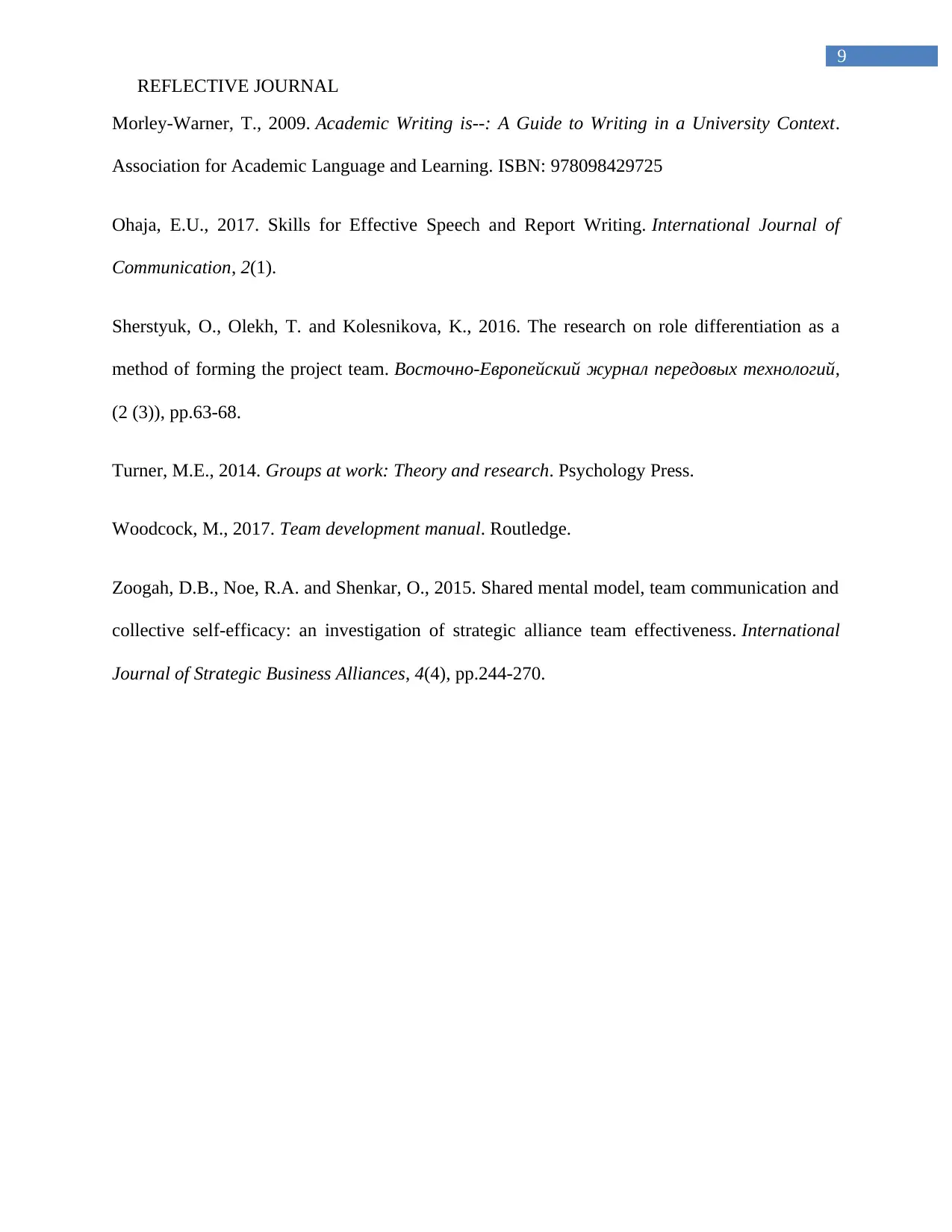
9
REFLECTIVE JOURNAL
Morley-Warner, T., 2009. Academic Writing is--: A Guide to Writing in a University Context.
Association for Academic Language and Learning. ISBN: 978098429725
Ohaja, E.U., 2017. Skills for Effective Speech and Report Writing. International Journal of
Communication, 2(1).
Sherstyuk, O., Olekh, Т. and Kolesnikova, K., 2016. The research on role differentiation as a
method of forming the project team. Восточно-Европейский журнал передовых технологий,
(2 (3)), pp.63-68.
Turner, M.E., 2014. Groups at work: Theory and research. Psychology Press.
Woodcock, M., 2017. Team development manual. Routledge.
Zoogah, D.B., Noe, R.A. and Shenkar, O., 2015. Shared mental model, team communication and
collective self-efficacy: an investigation of strategic alliance team effectiveness. International
Journal of Strategic Business Alliances, 4(4), pp.244-270.
REFLECTIVE JOURNAL
Morley-Warner, T., 2009. Academic Writing is--: A Guide to Writing in a University Context.
Association for Academic Language and Learning. ISBN: 978098429725
Ohaja, E.U., 2017. Skills for Effective Speech and Report Writing. International Journal of
Communication, 2(1).
Sherstyuk, O., Olekh, Т. and Kolesnikova, K., 2016. The research on role differentiation as a
method of forming the project team. Восточно-Европейский журнал передовых технологий,
(2 (3)), pp.63-68.
Turner, M.E., 2014. Groups at work: Theory and research. Psychology Press.
Woodcock, M., 2017. Team development manual. Routledge.
Zoogah, D.B., Noe, R.A. and Shenkar, O., 2015. Shared mental model, team communication and
collective self-efficacy: an investigation of strategic alliance team effectiveness. International
Journal of Strategic Business Alliances, 4(4), pp.244-270.
⊘ This is a preview!⊘
Do you want full access?
Subscribe today to unlock all pages.

Trusted by 1+ million students worldwide
1 out of 9
Related Documents
Your All-in-One AI-Powered Toolkit for Academic Success.
+13062052269
info@desklib.com
Available 24*7 on WhatsApp / Email
![[object Object]](/_next/static/media/star-bottom.7253800d.svg)
Unlock your academic potential
Copyright © 2020–2025 A2Z Services. All Rights Reserved. Developed and managed by ZUCOL.





